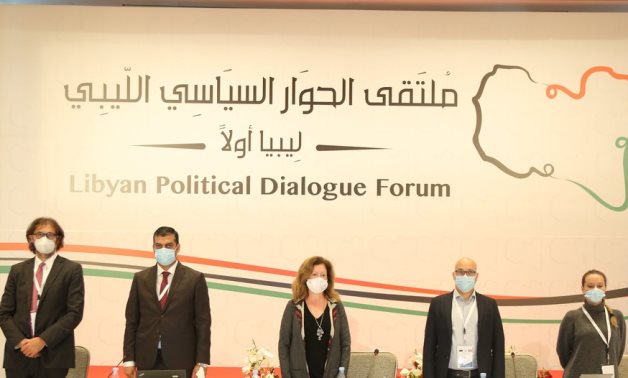
Acting Representative of the Secretary-General for Libya, Stephanie Williams (centre), during the first round of the Libyan Political Dialogue Forum, which was held in Tunis.
CAIRO - 6 December 2020: On Saturday, the Libyans were expecting the announcement of the mechanism that will be adopted to determine the form of the recent executive authority to select the leaders of their country in the following phase, which ends with conducting elections at the end of 2021.
This comes after nearly a month of complex political negotiations dominated by differences led by the United Nations with the participation of a broad and comprehensive Libyan side.
Over the course of two days, the 75 members of the Libyan Political Dialogue Forum in Tunis voted by phone and e-mail to select one of the ten mechanisms put forward by the United Nations Mission to select members of the Presidential Council and the Prime Minister.
It is expected that the UN mission in Libya will announce, Saturday, the results of the first round of voting and discuss the next steps, during a virtual meeting via a videoconference, to which all participants in the Forum for Political Dialogue in Tunisia were invited.
Ambiguity dominates the results of the vote, but sources close to the negotiations confirmed that the votes of the participants were divided between the second and third mechanisms, both of which are based on the division of executive positions through the logic of regional quotas.
The second mechanism stipulates each of the three regions shall nominate the names of two persons and then present to the plenary session of the Dialogue Committee for a vote on it, while the Prime Minister is elected by all members of the Dialogue Committee, in addition to appointing the President of the Presidency Council who belongs to the largest region.
Concerning the third mechanism, it stipulates that each region elects its representative in the Presidential Council in addition to that the Prime Minister is elected by all members of the Committee on the condition that a recommendation is obtained from the same region, meaning four recommendations from the south, five from the east, and seven from Tripoli.
Sources close to the scenes of the dialogue said the second mechanism is supported by the participants who support the assumption of political activist and businessman Misrati Abdul Hamid al-Dabaiba from the Western region for the post of the prime minister of the following government. They also support the Chancellor and the President of the Court of Appeal, Abdel-Gawad Al-Obeidi, from the East Region, to preside over the Presidency Council.
On the other hand, the third mechanism is backed by supporters of the Minister of Interior in the Government of National Accord, Fathi Bashagha, to head the government and Aquila Saleh to head the Presidency Council.
Days ago, UN Acting Special Representative Stephanie Williams said, during the latest meeting under the country’s Political Dialogue Forum, "20,000 foreign fighters now in Libya represent a serious crisis and a shocking violation of Libyan sovereignty”.
“You may believe that these foreigners are here as your guests, but they are now occupying your house. This is a blatant violation of the arms embargo,” said Williams, who also heads the UN Support Mission in Libya (UNSMIL).
“They are pouring weapons into your country, a country which does not need more weapons. They are not in Libya for your interests; they are in Libya for their interests. Dirou balkom (take care). You have now a serious crisis with regard to the foreign presence in your country," she added.
On November 14, the UN Mission in Libya said that representatives across the Libyan social and political spectrum have agreed to hold national elections in December 2021. "The 75 representatives reached this agreement at the Libyan Political Dialogue Forum, an inclusive intra-Libyan political dialogue platform," said Williams.
The forum was launched under the auspices of the United Nations shortly after the Libyan parties signed a UN-sponsored permanent cease-fire agreement in Geneva on Oct. 23 with an aim to discuss a political roadmap to end their year-long conflict and achieve lasting peace.
"Representatives of the six-day forum have reached a preliminary agreement on a roadmap for the preparatory phase towards the national elections," said William. She added that the representatives have started outlining the competencies of a reformed presidency council and a government of national unity.
Participants of the talks “are taking steps to ensure that the candidates for the selection process are asked to adhere to the principles of inclusivity, transparency, efficiency, pluralism, collegiality, and patriotism,” Williams stressed.
Oil-rich Libya has been mired in chaos since the ouster and killing of Muammar Gaddafi in 2011. It now has two rival authorities and a multitude of militias vying for control of the country.
The country’s internationally recognized government is based in Tripoli, while Khalifa Haftar, the commander of the Libyan National Army, is supported by a parallel administration based in the east.
Comments
Leave a Comment